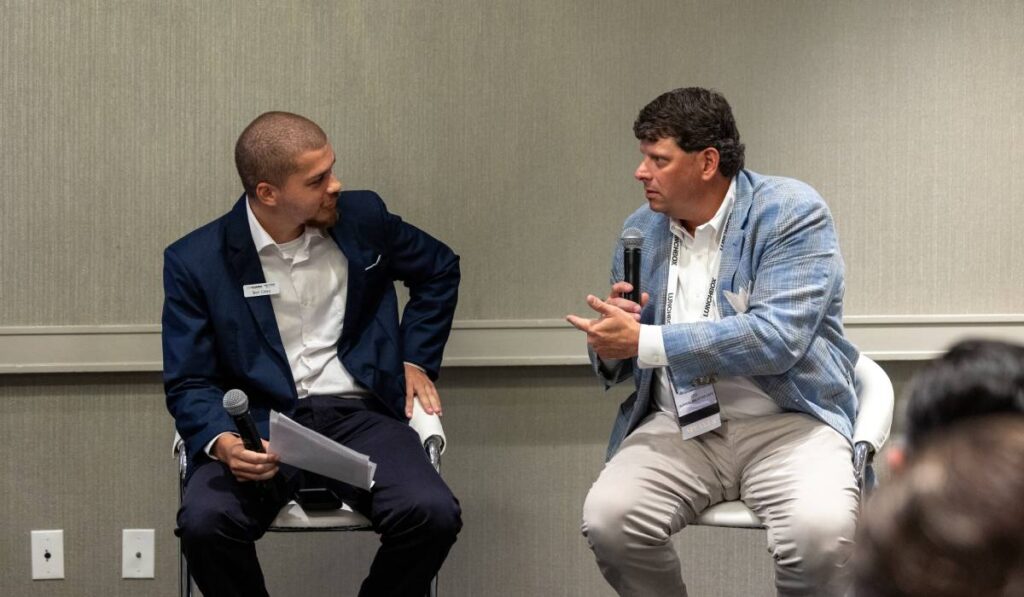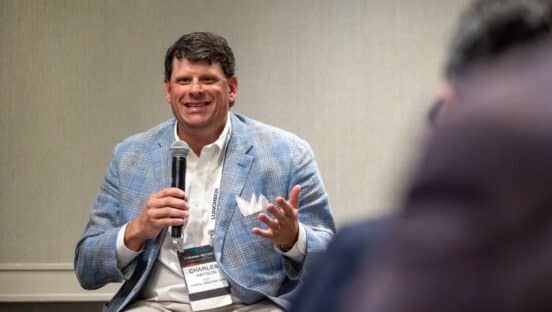Tropical Smoothie Cafe CEO Charles Watson puts Americans on a 1-10 scale when it comes to their nutritional lifestyle choices.
At one end of the spectrum is someone on the go, eating fast food six times per week. The other extreme, Watson says, are people who grow their own wheatgrass in their backyard and only eat non-GMO.
The CEO notes Tropical Smoothie lives in a more realistic world, catering to customers in the four to six range. For instance, the best-selling smoothie is the Bahama Mama, which features chocolate and strawberries—an indulgent treat at a better-for-you brand. Behind that in popularity is the Island Green, a concoction with five servings of fruits and vegetables without sugar. This diversity in product tells Watson there’s a big opportunity to do multiple things well.
“It broadens our scope of consumers that we can service,” Watson said at the inaugural QSR Evolution Conference in September. “Now all that said, there’s a lot of movement. What’s hot right now—you remember yogurt and 1,000 yogurt shops? What’s next? Bowls, smoothies, juice, every corner, new brand. Tom and Jane just made one. Here’s a brand with 50 units, etc. Unfortunately, for them, there’s a couple of offerings we’re coming out with very soon that we’ve got a lot more units, and we’ve got really great products. And when we add product lines, we’re going to compete really well. So stay tuned in December and January for what Tropical Smoothie has up its sleeve.”
Growing consumer demand is fueling franchise expansion. Through Q3, Tropical Smoothie opened 141 restaurants and signed 166 franchise agreements. That pushed the brand to 1,335 open locations. The fast casual debuted 51 restaurants and inked 77 deals in the third quarter alone, many of them coming from existing operators.
When people read these numbers, Watson is often asked, “You guys are doing a lot of deals. You’re opening a lot of restaurants. What’s the secret?” Truth is, he doesn’t have one. It’s the same story as any other brand feeling success—focus on unit-level economics and ensure profitability for franchisees. But by no means did this happen overnight, the CEO says.
Watson’s tenure began in 2010 as vice president of franchise development. Back then AUV was $460,000 and it cost about $325,000 to build a restaurant. That year, he sold 17 franchise agreements, which he thought was a disappointment. Watson was fully prepared for new private equity leadership to come down on him for low performance. That wasn’t the case. Instead, Watson received a reality check of where Tropical Smoothie was at that point in its history and what the future potential really was.
“He said, ‘Charles, I can’t believe you even did 17 deals,'” Watson recalls. “And that’s kind of true. At the end of the day, the business model has to make sense. And what I’m really proud of is that for American entrepreneurs out there, everybody that’s one of our franchisees is not a dyed-in-the-wool restaurant person. We have a model that we can replicate and that we can train and that we try to keep it simple while still providing a really high-quality, convenient product. It allows American entrepreneurs to really grow. The stories we have are amazing. I was a school teacher, I was a guidance counselor, and now I own seven Tropical Smoothies and I just built a big old house. Those are the best stories out there.”

Watson likes to think in terms of acronyms when describing the ideal franchisee. He has a big “PPPP” one that spells out to people+passion+process=performance. The operative part for him is people, which are the operators in this case. As for the passion, Watson and his team ask whether prospective franchisees love the brand enough to get out of bed every morning and spend 12 hours on their feet. Also, do they want it enough to coach 16–20 year olds? Not all of them can say yes. Watson remembered a time when the company helped a restaurateur sell their business after they were unable to deal with the younger employee base.
The ultimate vision for Watson is to “inspire better.”
“Inspiring better evokes passion,” he says. “When people ask me, ‘Great, Charles, that’s your vision. What does it mean?’ I go, ‘I don’t know. What does it mean to you? What does inspire better mean to you?’ And that’s what we ask our prospective franchisees because this is a street corner business. And if you can’t own that three to five-mile radius around your restaurant and people don’t know you as the mayor of Tropical Smoothie in that zip code, you’re not going to be as successful as you can be.”
The executive adds Tropical Smoothie is “easily” a 4,000- or 5,000-unit brand. In early September, the pipeline had 825 units, and that should increase to 850–860 by the end of 2023. If Tropical Smoothie converts those locations under development into open restaurants—which it has done historically at an 85 percent clip—that would put the company over 2,000 outlets. Watson adds Tropical Smoothie has the markets, branding, and offerings to double that unit count. He’s confident because the chain has lower development costs and provides flexible layouts. Currently, 40 percent of the system contains a drive-thru. Of the 170 shops that will open in 2023, almost 45 percent are drive-thru.
The goal is to focus on the 44 states where Tropical Smoothie resides. The six markets without one are Hawaii, Alaska, Montana, Vermont, Oregon, and Wyoming. Watson has been staunch on the fact that he wants the brand to get the U.S. correct before it goes international. That day is coming, the CEO predicted.
“Just based on the dietary and eating habits and what we sell, I think it’s an easy tweak internationally,” Watson says. “And when we go, we’re going to go big. But that time isn’t right this second.”
To stay on top of trends, Watson says the company is conducting a brand study to learn what the consumer wants in the post-pandemic landscape. There’s also continued work with the prototype and constant consideration around menu categories.
Make no mistake, Watson continues, Tropical Smoothie doesn’t have it all figured out. But it has a good head start.
“We got to bring all three of those things together and develop a brand that works for the next 25 years because I don’t get the 4,000 units unless I figure those things out while continuing to improve the profitability at the unit level,” Watson says. “So the trend of convenience and ease requires a back of the restaurant that works, it requires hospitality that works, it requires digital channels working—all of those things all together. This business has gotten real complicated, real fast. And we’re all scrambling and working our tails off to be able to provide that convenience and that fantastic product and that hospitality that has been the key to the restaurant business for as long as it’s been around.”








